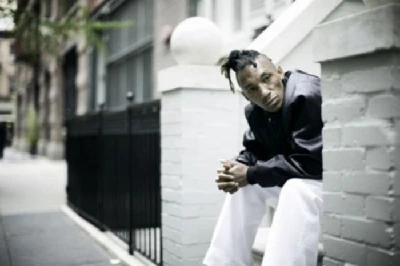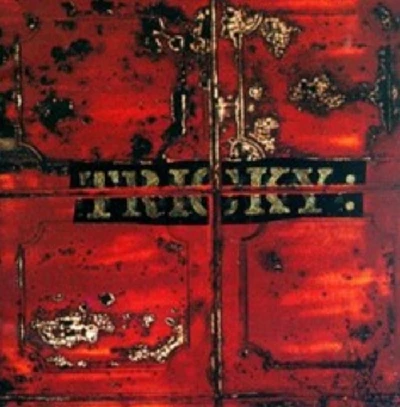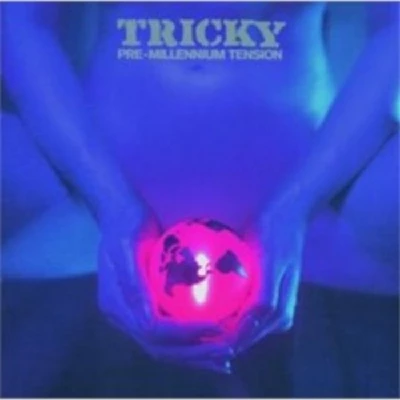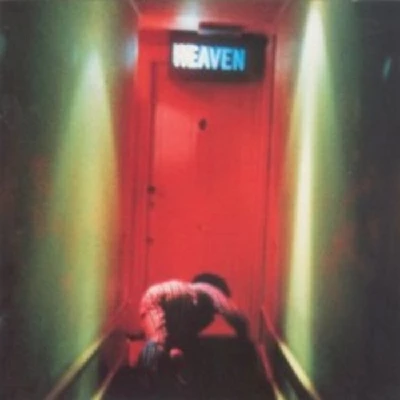published: 24 /
9 /
2009

In his 'This Metal Sky' column, Jeff Thiessen reflects upon the career of Tricky, and his three albums, 'Maxinquaye', 'Pre-Millennium Tension' and 'Angels with Dirty Faces'
Article
The concept of shelf-life in music is one that shouldn’t necessarily be embraced, but it’s one that must be accepted with a fair degree of certainty. It’s never fun lumping the possible extent of one’s artistic mileage with something like the expiration date of raw poultry, but it just seems to be the same general idea, which is something is good for a while, and then it is not. It’d be a lot easier if there were very definitive dates stamped on career tangibility (imagine how much easier Smashing Pumpkins fans would have had it if their group had a termination date of January 1st, 1999?).
Of course there isn’t, so we have a lot of fucking about by bands well past their point of relevance, and it’s a matter of inconvenience and irritation to all parties involved. The good news is, it’s really not that hard to figure out, so let’s try to make this more numerical and less of a crap shoot, shall we?
Now, it must be stated this theory doesn’t extend to behemoth groups like Led Zeppelin, Pearl Jam, U2, etc. These bands don’t really have a shelf-life in the true sense of the term since the sheer scope of their spectrum overwhelms such trivial stop-loss philosophies, unfortunately we don’t really have a choice but to let them lumber along until they completely run out of gas/no longer have vague socio-political issues to immaterially tackle/too many of the members die to really allow them to continue.
Instead, I’m talking about the acts that either a) Have talent that outstrips their ambition i.e. Massive Attack or b) Have ambition that outstrips their talent i.e. Magnetic Fields. In cases like this, I introduce the Three-Album Theory.
The basic idea of the theory is simple. It essentially states three albums is probably enough for a highly talented or ambitious act to get about 90% of their best ideas out there, and anything more than that is extracting a meal out of a morsel, and you know what happens when you play with starvation.....you start to snack on things that would ordinarily not be in your best interest, yours or the people witnessing it. The triptych of albums is a tremendously powerful tool, and it’s probably safe to say there was no purer example of one than the Stooges first three, which had an almost holy unity and was much more savagely linear than anybody gave it credit for.
Then they gave us 'The Weirdness'. Goddamnit.
In all my years, I have never witnessed an outset of three albums as remarkable as the aforementioned Stooges ones, but the closest I have heard come to those would be the first three solo records by Tricky, albeit in a fairly different manner (yet not as contrasting as you may assume).
There are plenty of bands that release three (or more) great albums in a row, right out of the gates. I love Zeppelin, and they pumped out like five pretty awesome records in succession, but why I can’t accurately reference them in regards to the Three Album Theory, or many other bands like them, is because there wasn’t really a true connection between those first few releases, even if they all were amazing in their own way.
No, a true triptych has three consecutively brilliant releases, but although they are all mesmerizing in their own unique way, the previous record never seems like it was a building block, instead they all scamper to vastly different places while still being within shouting distance of each other. That is to say, there may be varying degrees of advancement present, but it’s completely overshadowed by a whole host of other elements, so if there is a real progression involved, it’s sort of a moot point, due to the focus effortlessly placed on everything else surrounding it.
In one episode of 'The Sopranos', the ever-bitching Christopher was whining how every character in film has an arc, which has a low point, a high point, and a resolution in proximity to one of those two. It’s true his character was a scumbag drug-addict who pissed and moaned about anything that didn’t fall neatly into his life, but he had a point there, and take it from me, there is nothing more organic and beautiful than three records that successfully achieve such an inherent design, even if some of the fun is figuring out where on the arc each album might land.
This is probably why I love Tricky’s first three albums so goddamn much. They are all inextricably linked to each other, and certain parts build on each other. But other parts tear its origins down, and more parts still make you question everything you’re hearing in relation to the other two albums. Nothing is certain, and if there is something sacred to be gained here, it’s left entirely in the listener’s ability to pick up the pieces and create something with what you’re left with. The rest of his body of work is violently hit or miss (with the majority being some pretty wicked misses), but for the time being, let’s just operate under the Three Album Theory and leave the rest in the electro bargain-bins where they probably belong.
The first of the three is 'Maxinquaye', which was named after his late mother, Maxine Quaye who offed herself when he was four years old. Although Tricky is obviously the sonic architect behind every nuance on this creation, most of the vocals are put forth by his muse, Martina Topley-Bird, and it’s this unlikely combination of beauty and the beast that creates a core contradiction on 'Maxinquaye' that ensures there will always be something new clawing at each other on pretty much every successive listen.
It’s safe to say this is the favourite among fans, and you’d have to be blind to not see why. As dark and haunting as it is, one cannot listen to it and not be struck by one immediate but alarmingly clear revelation: “Ah so this is what cool sounds like”. Look, Miles Davis and his music are commonly referred to as the King of Cool, but the truth is, Miles’ best stuff was too challenging to be cool in the pure sense of the word. I mean just because the cat was a hip dude doesn’t mean his music was as laid back and inviting. 'Maxinquaye' is not something you have to learn to like; instead like all truly cool things in life, you have to strive NOT to like this, which seems like an awful waste of time, and why bother when so much of his later catalogue is so instantly loathsome?
Much like the Stooges' most powerful material, there is a lot going on beneath the murky surface, which might seem overly simplistic at first listen. Take 'Aftermath' for example, which is easily the strongest cut on 'Maxinquaye'. It’s mostly stoner psychosis, with Topley-Bird handling most of the vocal duties while Tricky comes and goes as he pleases. Listen closely though. 'Aftermath' never allows itself to drift into a smoke-filled haze. Instead it insists on rumbling guitar and a sense of volatility creeps up on us, even in its most languid state. After a flute floats through the corridor, we’re left with nothing but Tricky muttering, “Just when I thought I could not be stopped/just when I thought I was winning”, and we’re struggling with something strangely familiar, yet now with a pretty lucid sense of being completely surrounded by something we can’t see, but desperately want to reach out and touch.
Nearly as good is 'Hell is Round the Corner'. It doesn’t have the clever bait-and switch of 'Aftermath', but with a harrowing Issac Hayes sample worryingly appearing in every possible vulnerable moment in the track, it’s tough to not view this song as an island, even if it exists in a pretty astonishing prism that is nearly every bit as mesmerizing as those sparse instances that make 'Hell is Round the Corner' one of the most nakedly cutting pieces of blues music ever committed to record.
The real brilliance of 'Maxinquaye' lays in just how intensely simple and accommodating the general sound of the album appears to be, almost like shooting fish in a barrel, except here, it’s like holding a gun over the barrel, with the fish grabbing the chamber and pointing it towards themselves. Nothing is forced here, and within the confines of every basic structure here, there are subtle nuances that transform the music here from being a run-of-the-mill abandoned cabaret mopefest, to something much more real, something we can all latch onto, without even knowing how or why. There’s a lot of chaos on 'Maxinquaye'. In between all the bluesy drum beats and plucking guitar strings, bedlam flows in at will, but it disappears just as quickly. We’re left with a feeling of serenity, not quite sure why, and that’s probably because if we stopped to think about it, we’d be pretty terrified with the conclusion that to most of us, confusion is the only thing that makes any sense.
After 'Maxinquaye', Tricky kinda freaked out. The critical and commercial success of it rocketed him to stardom, plus made him the unofficial ambassador of the trip-hop term, a label as revolting as it is disdainful. A lot of things changed in his life, a lot of leeches tried to cash in on the new trip-hope movement, and there is no way we could expect another 'Maxinquaye' from this guy. There was just too much swirling around in his head to logically expect anything as viciously streamlined as his first effort.
So he gave us a punk record. 'Pre-Millennium Tension' was released in 1996, two years after his debut, and from the first notes, it’s pretty clear his music will no longer be staples of chill-out compilations made for hash-heads and used book stores. Tricky’s music will never be considered ‘beer on a patio’ consideration, and it goes even further down the spiral here with 'Pre-Millenium Tension'. I’m not exaggerating to say I was a tad disoriented when I first heard the bugged out guitar-assault of the opening track 'Vent' when I first picked up this album, and truth be told, if it continued down that path there wouldn’t be enough Vicodin in the world to escape the entirety of the album without a skull-splitting headache, but thankfully there is reprieve.
Even if 'Pre-Millenium Tension' does hover into some truly bizarre areas, it has to be understood these are rhythms created from a very bloodcurdling place. Nobody likes a cheater, but for some reason, we’re inclined to let Tricky get away with skipping a lot of autobiographical material we are probably entitled to if he’s going to make music that painfully details the smallest shard of paranoid minutia of his life, almost exclusively. We let it pass, because after a while, we’re convinced there’s a lot more to Tricky than this drug-addled lunacy, but not entirely. The more I listen to 'Pre-Millenium Tension', the more I’m convinced that sometimes because something or someone is endlessly intriguing, we automatically assume there is much more to pry open. We never really consider the fact all the person is offering and all that we are desperately grasping onto, is all that there is, but how can something so rewarding exist in a vacuum?
If nothing else, 'Pre-Millenium Tension' is hard evidence, not overwhelmingly so, but a pretty strong reminder such a relationship is not to be trivialized, and it’s not something that has to be attempted to be morphed into something different, a superior version of itself. Like it or not, sometimes there is only one version to be embraced or rejected, and the more we try and delve into something that plainly does not exist, that’s when dementia comes in masquerading as some garbage like meaning of self or others. That may put a smile on your face, but your grip is now gone, and 'Pre-Millenium Tension' constantly tests our threshold to accept/embrace the limitations of face value in its most pure and blissful state, even if playing it at loud volumes most likely triggers any acid flashbacks waiting to happen.
The third and final entry in Tricky’s triptych, is my personal favourite, 'Angels With Dirty Faces'. Again, gone is the deceptively accommodating feel of 'Maxinquaye', and also done is the dreary hell found on so many moments on 'Pre Millennium Tension', specifically in tracks like 'Ghetto Youth' and 'Piano' (its two most memorable songs ). It’s almost impossible to describe the sound-scape of 'Angels with Dirty Faces', but I guess the best way I could put it is dying just to catch a ghost. There is no agreement between the listener and Tricky here, except perhaps he really doesn’t give a fuck by this point what we think, and it’s a classic "you’re on the bus or off it" scenario that leaves no room for meddlers. There are no shades of grey here, no alternatives or unique ways to interpret the music here, no way to realistically compare it to anything else Tricky has done (even on an aesthetic level), and also does not allow us even an absurd capacity to imagine this could be made by anybody but Tricky himself.
If you can admit all this, even if you think the record sucks, you have already acknowledged the fact it’s destined to go down as one of the all time great rock 'n' roll albums.
And that it is, a rock record, of course not in the traditional sense. On 'Angels with Dirty Faces', he has painted himself into a corner, and this is made obvious by about halfway through his rampaging, nonsensical rants on the opener 'Money Greedy', and being trapped in this angle with this particular wacko might be an unnerving concept for some. While I generally get annoyed when bands end up in this spot, in the case of Tricky, everything else up till this point was, however. just a detour. This is home for him.
So we’re left with a question, what does home mean for Tricky? Without a doubt, this is his purest offering of everything he is capable of while simultaneously having no qualms giving us a detailed tour of all of his shortcomings, both in a literal sense, and a historical one. I’m not going to say 'Angels with Dirty Faces' ties up all the loose ends and tangible differences between 'Pre-Millennium Tension' and 'Maxinquaye', and naysayers will reduce this offering as the aural equivalent of picking some scabs, but those are the same people who don’t see patchwork as a valid form of destruction and repair.
It’s really hard to overemphasise the starkness of 'Angels with Dirty Faces', but at the very least, it carries the credibility of a survivor. A survivor who has been to hell and back, then hastily vows to make some clichéd life-affirmation like "live every day like it’s your last" is totally uninteresting to me, just because of the fleeting nature of the words. It’s a knee-jerk reaction to circumstance to say such things, or perhaps the person just feels as though they should be relaying such obvious nonsense for the delight of the peanut gallery, but ultimately it will most likely be lumped in with all those new years resolutions, gym memberships, and non-fat yogurt cartons you swore would now become an integral part of your life.
The concept of a survivor is far more relevant to me when it comes to those who feel like every day is survival and not because of harsh external conditions or anything like that. Instead, in the sense that their world is constantly in motion, relentlessly churning and grinding away, while the survivor’s heart and guts remain interminably stable. In cases like this, survival isn’t some grand, S.O.S. story, it’s no life affirmation, it’s a perpetual life-realization, and 'Angels with Dirty Faces' has no problem seeing the future, because in a sense, every day’s hell is exactly the same as the one before it, just in different packaging. Chronicling this daily journey isn’t tearing pages out of someone’s diary; it’s tearing out their eyes.
“Those men will break your bones. Don’t know how to build stable homes”
-'Broken Homes'
Sidenote: Tricky also released 'Nearly God', which technically might be his second release (and his best album, easily) but because it was much more collaborative, I didn’t include it in my Three Album Theory, hence it still is a triptych, and not whatever the word is for four astounding albums in a row. Go ask Don Henley, I’m sure he’d be able to tell you.
Picture Gallery:-



